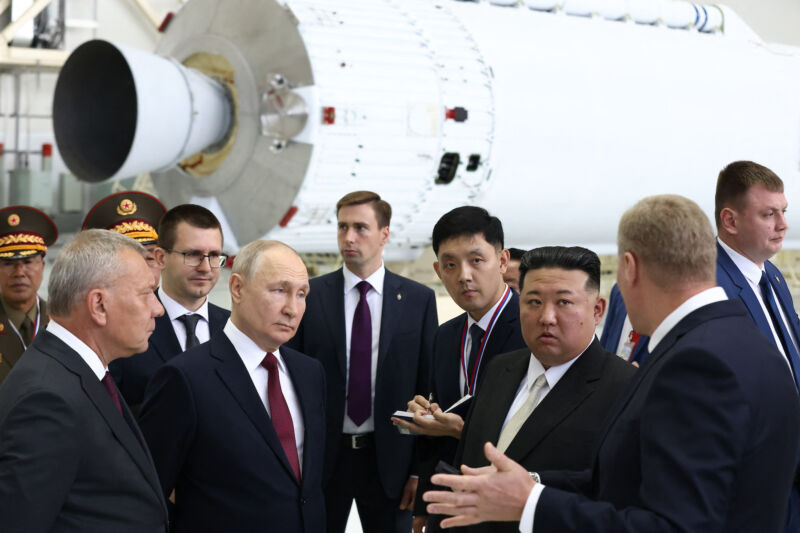Ukraine war briefing: multiple casualties in Russian attack on Dnipro apartment block
Infant among six injured, with at least one dead and more trapped in building in central Ukraine; 10 Ukrainian civilians freed from Russia and Belarus jails in Vatican-mediated deal. What we know on day 857
A Russian missile strike hit a nine-storey residential building in the central Ukrainian city of Dnipro on Friday, killing at least one person and injuring six others, officials said. The death toll would likely rise as more people remained trapped in the building, where four upper storeys collapsed as a result of the attack, said the interior minister, Ihor Klymenko. A photo posted on Telegram by the governor, Serhiy Lysak, and other images on social media showed a badly damaged building that had smoke rising from a gaping hole in its upper storeys. A seven-month-old infant was among the injured, Lysak said. Three people were in severe condition.
Volodymyr Zelenskiy said 10 civilians including a politician and two priests taken prisoner in Russia and Belarus had been freed in a deal mediated by the Vatican. Russia and Ukraine have exchanged hundreds of prisoners throughout their two-year conflict but the release of civilian prisoners is rarer. “We managed to return 10 more of our people from Russian captivity,” the Ukrainian president said on Telegram. It was not immediately clear if the release was part of an exchange deal involving Russian prisoners held in Ukraine. Some of those released had been in prison since 2017, he said, arrested in Russian-controlled parts of eastern Ukraine that at the time were run by Moscow-backed separatists.
Russia’s defence ministry claimed its forces had taken control of the settlement of Rozdolivka in eastern Ukraine, but the Ukrainian military said heavy fighting was raging in areas around the settlement. The Russian ministry said on Friday that Russia’s “southern” military grouping had taken up what it called more favourable positions after pushing Ukrainian forces out of the settlement. Rozdolivka is in the Donetsk region, the focal point of Russia’s slow advance across eastern Ukraine. It lies north of Bakhmut and Soledar, two localities brought under Russian control last year.
The Ukrainian military’s general staff said Russian forces had launched 19 attacks in a broad sector that included Rozdolivka. “Our soldiers resolutely held their defences and repelled 15 of the assaults,” the evening report on Friday said. “Four armed confrontations are continuing.” The battlefield accounts from either side could not be verified.
The Biden administration will provide Ukraine with $150m worth of weapons and ammunition, including Hawk air defence interceptors and 155mm artillery munitions, two US officials said. The weapons aid package was expected be unveiled on Monday, they said on Friday, declining to be named. The administration is responding to Ukraine’s desperate requests for air defence support as Russia has pounded Ukrainian energy facilities in recent weeks via aerial attacks.
Vladimir Putin said Russia should start producing short- and intermediate-range missiles that were previously banned under a now-defunct arms treaty with the US. The Russian president was referring to missiles with a range of 500 to 5,500km (300-3,400 miles) that were banned under the cold war-era intermediate-range nuclear forces (INF) treaty. Washington withdrew from the deal in 2019, citing Russia’s failure to comply. The Kremlin said at the time that it would abide by a moratorium on production if the US did not deploy missiles within striking distance of Russia. In a televised address to his top security officials on Friday, Putin said the US had started using such missiles in training exercises in Denmark and “we need to react to this”.
Russia’s defence minister has ordered officials to prepare a “response” to US drone flights over the Black Sea, the ministry said, in an apparent warning that Moscow may take forceful action to ward off the American reconnaissance aircraft. The Russian defence ministry noted a recent “increased intensity” of US drones over the Black Sea, saying they “conduct intelligence and targeting for precision weapons supplied to the Ukrainian military by western countries for strikes on Russian facilities”.
The International Monetary Fund’s executive board has voted to approve a $2.2bn payout for Ukraine under an existing loan programme, and lowered its growth outlook following “devastating” Russian attacks against the country’s energy infrastructure. The much-needed funds would be used for “budget support” and bring the total amount disbursed under the 48-month loan agreement to about $7.6b, the IMF said on Friday.
Continue reading...© Photograph: Mykola Synelnykov/Reuters
© Photograph: Mykola Synelnykov/Reuters


 Source: X[/caption]
AzzaSec is an infamous actor that infects computers and encrypts files. It later demands a ransom for its decryption. Once a computer is infected, AzzaSec assigns the '.AzzaSec' extension to the filenames. It alters files such as '1.png' to '1.png.AzzaSec' and '2.pdf' to '2.pdf.AzzaSec.'
Additionally, it changes the desktop wallpaper and provides a ransom note via a pop-up window like the screenshot below.
[caption id="attachment_79190" align="alignnone" width="1828"]
Source: X[/caption]
AzzaSec is an infamous actor that infects computers and encrypts files. It later demands a ransom for its decryption. Once a computer is infected, AzzaSec assigns the '.AzzaSec' extension to the filenames. It alters files such as '1.png' to '1.png.AzzaSec' and '2.pdf' to '2.pdf.AzzaSec.'
Additionally, it changes the desktop wallpaper and provides a ransom note via a pop-up window like the screenshot below.
[caption id="attachment_79190" align="alignnone" width="1828"] Source: X[/caption]
The group demands ransom through Bitcoin. AzzaSec’s sophisticated encryption techniques and the secrecy of cryptocurrency transactions make it increasingly difficult for authorities to crackdown and defuse the cybercriminals.
AzzaSec recently announced the release of a
Source: X[/caption]
The group demands ransom through Bitcoin. AzzaSec’s sophisticated encryption techniques and the secrecy of cryptocurrency transactions make it increasingly difficult for authorities to crackdown and defuse the cybercriminals.
AzzaSec recently announced the release of a  Source: X[/caption]
According to a
Source: X[/caption]
According to a 
 Source: Rewards for Justice[/caption]
The U.S. authorities, along with the $10 million bounty, released scarce but very important details on Stigal's cyber trail - his aliases or the threat group names with whom he is affiliated. The Cyber Express did an open-source intelligence (OSINT) study on these aliases and found the following details on Amin Stigal's cyber activities:
Source: Rewards for Justice[/caption]
The U.S. authorities, along with the $10 million bounty, released scarce but very important details on Stigal's cyber trail - his aliases or the threat group names with whom he is affiliated. The Cyber Express did an open-source intelligence (OSINT) study on these aliases and found the following details on Amin Stigal's cyber activities:

 Source: Cyble[/caption]
The hackers use a technique called DLL sideloading, where a malicious library file masquerades as a legitimate one. This allows the attackers to run their code under the guise of trusted software. Additionally, they employ a tool called Shadowloader to inject the XWorm RAT into a running process, further obscuring its presence.
The XWorm RAT is then executed, offering a range of capabilities, including data theft,
Source: Cyble[/caption]
The hackers use a technique called DLL sideloading, where a malicious library file masquerades as a legitimate one. This allows the attackers to run their code under the guise of trusted software. Additionally, they employ a tool called Shadowloader to inject the XWorm RAT into a running process, further obscuring its presence.
The XWorm RAT is then executed, offering a range of capabilities, including data theft,  Source: Cyble[/caption]
While the initial infection vector remains unclear, researchers suspect phishing emails may play a role. The intended victim could not be ascertained from accessing the the Excel lure used in the campaign. CRIL researchers had previously observed the UAC-0184 threat actor group employing lures tailored to appeal to Ukrainian targets, often mimicking official government or utility communications.
Source: Cyble[/caption]
While the initial infection vector remains unclear, researchers suspect phishing emails may play a role. The intended victim could not be ascertained from accessing the the Excel lure used in the campaign. CRIL researchers had previously observed the UAC-0184 threat actor group employing lures tailored to appeal to Ukrainian targets, often mimicking official government or utility communications.

 Source: U.S. Department of the Treasury[/caption]
The Treasury added all the above individuals to its
Source: U.S. Department of the Treasury[/caption]
The Treasury added all the above individuals to its 

 Source: SBU[/caption]
According to the SBU, the accounts hosted on this bot farm were also used to spread pro-Kremlin propaganda purporting as ordinary Ukrainian citizens.
Another 30-year-old man from Dnipro allegedly registered nearly 15,000 fake accounts on various social networks and messaging platforms using Ukrainian SIM cards. He sold these accounts to Russian intelligence services on darknet forums.
[caption id="attachment_77337" align="aligncenter" width="1024"]
Source: SBU[/caption]
According to the SBU, the accounts hosted on this bot farm were also used to spread pro-Kremlin propaganda purporting as ordinary Ukrainian citizens.
Another 30-year-old man from Dnipro allegedly registered nearly 15,000 fake accounts on various social networks and messaging platforms using Ukrainian SIM cards. He sold these accounts to Russian intelligence services on darknet forums.
[caption id="attachment_77337" align="aligncenter" width="1024"] Source: SBU[/caption]
Both suspects face up to three years in prison or a fine if found guilty. The investigation continues.
Source: SBU[/caption]
Both suspects face up to three years in prison or a fine if found guilty. The investigation continues.


 Items seized in Ukraine ransomware arrest[/caption]
The Ukraine
Items seized in Ukraine ransomware arrest[/caption]
The Ukraine 








